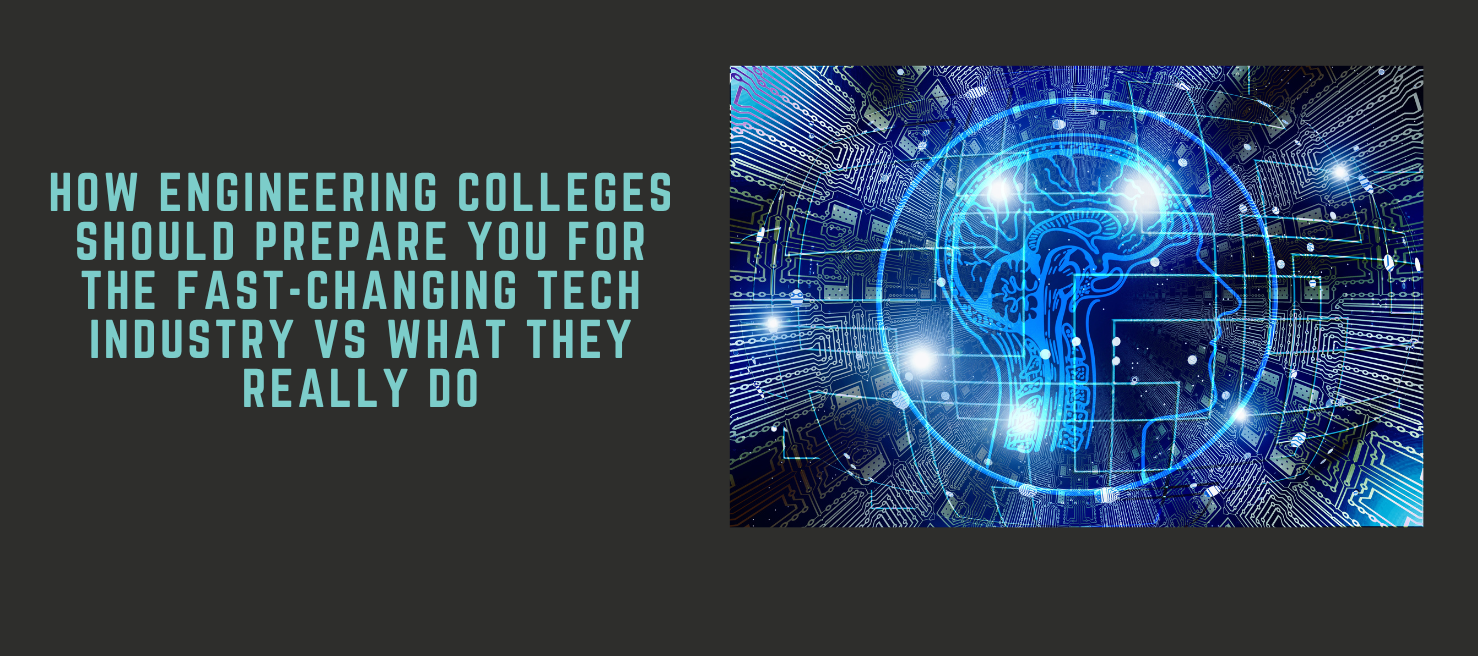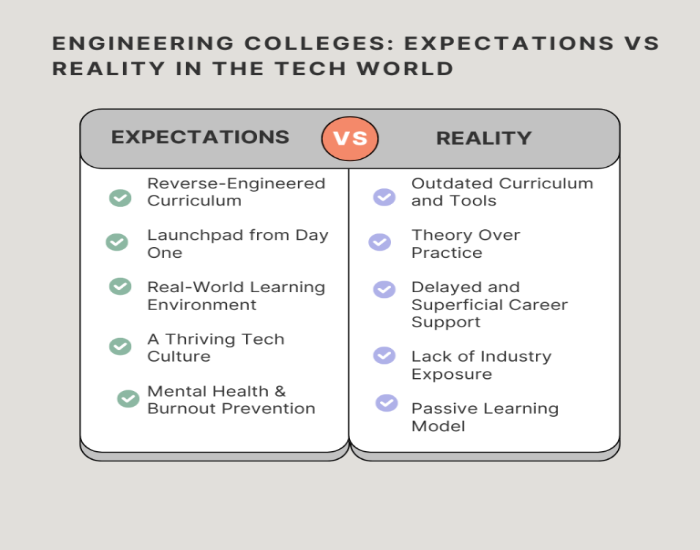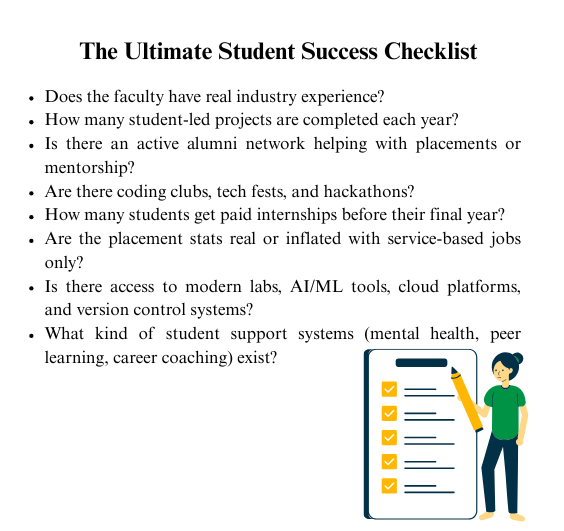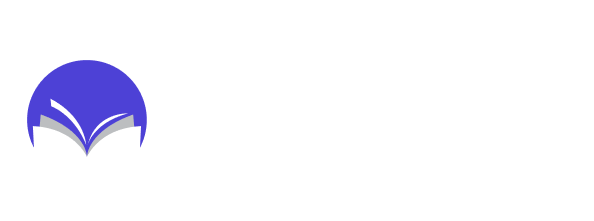Summarise With AI

You’ve done the hard part—studied day and night, aced your boards, given the entrance exams, and now you’re focusing on your dream engineering college.
But here’s a question almost no one asks at this stage:
Will this college actually prepare you for the tech world you’re about to enter?
In a world where AI evolves faster than syllabus change, where companies hire based on GitHub profiles and real-world problem solving, not marks, how do you know if your future campus is ready for that world?
And more importantly… Are you ready to take charge if it isn’t?
Through our blog, we aim to break down the stark difference between what engineering colleges should be doing to prepare you for 2025’s tech landscape—and what most of them really do. But we are not stopping at just pointing out the problem.
We’ll also help you:
Understand what really matters in today’s engineering education
Asking smarter questions when comparing colleges and, most importantly, building your own roadmap, starting right now
Are you ready? Let’s dive in!!
The New Tech Reality – What Today’s Industry Demands
A degree is insufficient in the fast-paced computer industry of today; employers prefer practical experience and proof of ability. The industry is changing due to technologies like AI, cloud, and DevOps, which require engineers to have practical experience. However, barely 10–15% of India’s 1.5 million engineering graduates land new tech jobs, and only approximately 45% of them fulfil industry standards. Every few months, technology advances, causing education systems to lag behind. Students need to start preparing for a future that won’t wait outside of the classroom.
What Top Tech Companies Actually Expect from Freshers
1. Real-World Based Project Work
Building basic programs isn’t enough. Employers want to see projects that solve actual problems, such as websites, apps, automation scripts, or new models, that reflect initiative and creativity.
2. Portfolios Speak Louder Than Marks
A strong GitHub profile or personal website showcasing your work, contributions, and experiments matters more than your semester grades. It’s your digital resume.
3. Team Collaboration
From brainstorming to delivery, companies want candidates who know how to work in teams, communicate, solve conflicts, and get things done collectively.
4. Fast Adaptability
Today’s tech world changes fast, and what matters is how quickly you can learn and apply new tools under pressure. Companies now expect hands-on skills in AI, ML, prompt engineering, and using tools like ChatGPT, Claude, perplexity, Google Veo, etc. The faster you adapt, the more valuable you become in any tech role.
Skills That Matter in 2025 and Beyond
- AI & Machine Learning (AI/ML)
ML is now part of everyday applications, from recommendations to fraud detection. Even basic knowledge of models, datasets, and libraries like TensorFlow or scikit-learn gives you an edge. - Full-Stack Development
Being proficient in both front-end and back-end (React + Node.js, or HTML/CSS + Django/Flask) makes you job-ready faster. - Cloud & DevOps
Businesses rely on Google Cloud Platform (GCP), AWS, or Azure. Understanding cloud deployment, management, and DevOps practices like CI/CD, Docker, and Kubernetes is crucial. - GitHub Presence
A clean, consistent, and active GitHub profile builds your credibility. Commit regularly, contribute to open-source projects, and showcase your work. - Soft Skills
Tech skills alone won’t get you far. Communication, problem-solving, teamwork, adaptability, and leadership are equally important. - Data Analytics
Data-driven decision-making is essential today. Knowing how to collect, analyze, and interpret data using tools like Python, Excel, or Power BI adds significant value. - Cybersecurity Basics
With increasing digital threats, a foundational understanding of cybersecurity principles and best practices helps protect data and systems, making you a more trusted professional.
What Ideal Colleges Should Do (But Rarely Do)

An ideal college should help students build skills that align with real job roles. Instead of treating learning like a checklist, it should nurture curiosity, mentor innovation, and prepare students to step confidently into the tech industry. Unfortunately, most colleges still follow outdated systems. But let’s see what great institutions should be doing.
Reverse-Engineered Curriculum
An ideal college starts by understanding:
- What product companies and startups expect.
- What skills are trending in LinkedIn job postings and company JD breakdowns?
From there, the syllabus should be tailored backwards, teaching what the market demands and integrating:
- Modern languages like Python, JavaScript, and Go.
- Frameworks like React, Flask, and TensorFlow.
- Git, version control, REST APIs, and deployment tools.
The curriculum should focus on creating professionals, not just passing exams.
Launchpad from Day One
Start Preparing from Semester 1, Not Year 4
- Resume building, LinkedIn optimisation, and GitHub presence must start from the first year.
- Teach students how to craft their digital presence and showcase projects, certifications, and achievements.
- Conduct mock interviews, introduce hiring challenges, and explain how recruiters think.
- Help students understand the startup ecosystem, freelance opportunities, and alternate career paths from the beginning.
Real-World Learning Environment
Simulate the Workplace Inside Campus
- Internships should not be optional or superficial; they need to be integrated into the curriculum with appropriate credits and deliverables. In order to supplement this, the AICTE has introduced 200,000 virtual internships aimed at providing students with genuine industry exposure and enhancing their job readiness. This initiative demonstrates that even leading educational organisations recognise the vital importance of hands-on experience in today’s job market.
- Regular mentorship sessions with real industry professionals help students bridge the knowledge gap.
- Students must engage in live projects with real clients, use collaborative tools like Git, and follow real software cycles (SDLC, Agile).
A Thriving Tech Culture
Beyond Classrooms—Let Innovation Breathe
- Build an active tech community by supporting students’ growth through peer-led meetups, coding communities, and coding clubs.
- Hold regular hackathons and startup challenges to foster teamwork and practical problem-solving. These events will enable students to apply classroom concepts in real-world, time-constrained challenges (24–48 hours), boosting creativity and collaboration.
- Promote exposure to startups, incubators, and entrepreneurial activities to ignite innovative thinking and business skills.
- Hold alumni meetups for sharing success stories, career advice, and industry insights, creating a strong support network.
- Create a campus environment where students actively build, experiment, and innovate rather than just memorize.
Mental Health & Burnout Prevention
Academic pressure is real, and ignoring student well-being leads to burnout, anxiety, and dropouts. Progressive colleges now provide:
- On-campus counselling, therapy access, and trained mental health professionals.
- Peer support groups and Success coaches.
- Flexible policies for assignment submissions, break days, or creative downtime.
- Sessions on emotional intelligence, stress management, and motivation strategies.
“Having student success coaches or dedicated well-being mentors is no longer a luxury; it’s a basic need.”
What Most Tier-2 and Tier-3 Colleges Actually Do
Despite growing awareness, many Tier 2 and Tier 3 colleges continue to be stuck in outdated practices. Students often enter excited about technology and leave with frustration due to a lack of exposure, opportunities, or guidance. It’s important to recognize these red flags when choosing a college.
Outdated Curriculum and Tools
Missing the Tools of Today’s Tech Jobs
- Programming starts in the second year, often using outdated languages like Pascal or C without real-world context.
- No exposure to cloud tools, modern IDEs, or trending tech stacks like React, Node.js, or AI/ML frameworks.
Theory Over Practice
Marks Over Mastery
- Colleges focus heavily on written exams, viva questions, and lab manuals instead of real learning.
- Practical projects are either skipped or copied and pasted from seniors.
- Emphasis is on passing, not on problem-solving or creation.
Delayed and Superficial Career Support
Too Little, Too Late
- Placement training usually starts in the final year, when it’s already too late to build foundational skills.
- Colleges sign MoUs with companies but often fail to ensure students get meaningful internships or placements.
- Career guidance is generic, with little personalized mentorship or strategic planning.
Lack of Industry Exposure
Disconnected from the Real World
- Rarely host guest lectures or invite working professionals.
- No technical mentorship, industry webinars, or live demo sessions.
- Students graduate without having worked on a single real-life project under supervision.
Passive Learning Model
Textbook Teaching, Zero Engagement
- Lectures are mostly monologues, discouraging questions or open discussions.
- Creativity and critical thinking are rarely encouraged.
- Assignments are recycled, and there is no incentive to explore beyond the syllabus.
Impact of the Gap
The disconnect between traditional engineering education and industry needs has led to serious consequences:
Graduates Are Underprepared for Tech Roles
By the final year, many students realize they lack the skills required for modern tech jobs. While they may have learned the theoretical basics of AI, ML, or cloud computing, they often struggle with applying these to real-world problems. As a result, even when opportunities exist in high-demand domains, only a few candidates are truly job-ready. Many end up in low-impact roles or re-enrol in tech bootcamps to catch up.
Burnout & Impostor Syndrome Are Rising
Entering the workforce unprepared leads to stress and self-doubt. Freshers often feel like impostors when faced with fast-paced environments and real responsibilities. A recent survey revealed:
- 72% of IT employees work over 48 hours a week
- 25% work more than 70 hours
- 83% report burnout
For fresh graduates, this high-pressure environment, combined with a lack of foundational preparation, can lead to anxiety or even career dropouts.
Overdependence on External Upskilling
Many students are seeking boot camps, online courses, and YouTube tutorials due to insufficient practical training in colleges. While these resources can be beneficial, they come with additional costs in terms of time, money, and mental strain. As a result, students often feel overwhelmed trying to address gaps that should have been covered during their college education.
The result?
A growing number of engineering grads struggle to secure roles in product-based or tech-driven companies, despite a booming demand in AI, cloud, EVs, and semiconductors. The longer this mismatch continues, the more students risk falling behind in a fast-moving tech world.
So, What Can You Do as a Student?
Even if your college isn’t ideal, you can still become a top-tier candidate. The internet has democratized learning. Platforms like YouTube, GitHub, LinkedIn, Stack Overflow, and Udemy enable you to acquire skills independently. The secret lies in taking responsibility for your growth and making informed decisions about where and how you learn.
The Smart Student’s Checklist for Evaluating Engineering Colleges

When choosing a college, ask these questions:
- Does the faculty have real industry experience?
- How many student-led projects are completed each year?
- Is there an active alumni network helping with placements or mentorship?
- Are there coding clubs, tech fests, and hackathons?
- How many students get paid internships before their final year?
- Are the placement stats real or inflated with service-based jobs only?
- Is there access to modern labs, AI/ML tools, cloud platforms, and version control systems?
- What kind of student support systems (mental health, peer learning, career coaching) exist?
“Choose colleges that align with your goals, not just your exam rank”
Using College Comparison Tools
With so many options, picking the best engineering college can be difficult. Not all colleges deliver where it counts. In such cases, you should prefer using tools such as College comparison tool. Compare side by side to see who’s serious about practical, industry-ready skills — from real learning and career support to life on campus. Make your choice based on what truly matters.
This tool helps you compare colleges on critical factors including:
- Curriculum Relevance: See how updated the syllabus is with respect to the latest technologies and industry trends.
- Internship Quality: Verify if colleges offer meaningful internship programs that connect students with genuine companies.
- Alumni Strength: Understand the power of the alumni network in helping you with mentorship, jobs, and professional growth.
- Industry Connections: Evaluate the strength of ties with product companies, startups, and tech communities.
- Placement Success: Compare actual placement records, package offers, and roles secured by students.
- Peer and Culture Ecosystem: Learn about student clubs, hackathons, coding communities, and the overall tech culture.
“Evaluate how your shortlisted colleges rank in industry relevance, not just academic marks. Make a more informed, future-proof decision rather than one based solely on rankings or popularity.”
Conclusion
Before choosing a college, don’t just look at the rankings or placement numbers. Ask yourself:
“Will this college prepare me for a tech world that’s evolving every 6 months?”
And if the answer is no, then ask:
“Am I ready to take charge of my own learning to fill the gaps?”
A complete transformation of the education system will take time, but the message is clear: engineering education must evolve or risk becoming Obsolete. Students and parents should begin to demand colleges that provide real readiness outcomes, rather than just a degree label.
Instead of pursuing brand prestige, it is wiser to choose institutions or programs that demonstrate positive outcomes, where the curriculum, culture, and community are all focused on preparing you for the job market.
“Ultimately, whether you attend an IIT or a Tier 3 private college, your career is yours to shape. Colleges serve as platforms, but you are the pilot. The sooner you take control, the further and faster you will go.”
Frequently Asked Questions
1. Can I succeed without an IIT or NIT tag?
Absolutely. Skills, consistency, and visibility matter more. Many developers at top companies like Google or Amazon come from private colleges but have strong portfolios and GitHub projects.
2. Why are most engineering graduates not job-ready?
Because of a strong focus on theory and out-of-date curricula in their college education, the majority of engineering graduates are not prepared for the job market. They often lack practical experience with new technologies (such as cloud, AI/ML, and DevOps), project-based learning, and real-world tools skills that are crucial in today’s tech sector.
3. What skills do tech companies expect from engineering graduates today?
Tech companies expect graduates to have practical knowledge of full-stack development, cloud platforms, DevOps tools, AI/ML basics, and strong coding skills. They also look for soft skills like communication, problem-solving, teamwork, and a solid GitHub portfolio that shows real project work.
4. How do I know if a college really offers good placements?
Check the company names, roles offered, and whether students are getting core tech jobs or just support roles. Speak to alumni if possible.
5. What is outcome-based learning, and how is it better?
Outcome-based learning means focusing on what students can actually do after finishing a course, like solving problems or completing projects, rather than just covering topics. It’s better because it helps students gain real skills that employers want, making them ready for jobs and real work instead of just passing exams.
6. What languages/tools should I learn before joining college?
Start with Python or C. Then move on to JavaScript, SQL, Git, and basic HTML/CSS. These are beginner-friendly and widely used.
7. Is AI/ML necessary for all students?
It depends on your interest, but understanding AI/ML basics is useful across many domains, including finance, healthcare, and marketing.
8. Should I focus only on coding?
No. Your problem-solving skills, effective communication, and collaboration are as vital as your coding abilities.
9. Are online certificates enough to get a job?
No. They help, but recruiters want proof that you’ve applied the skills in projects. Link your certificates with GitHub code or demos.







